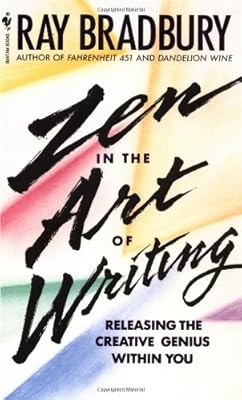Noble’s Book of Writing Blunders by William Noble (Writer’s Digest Books, Cincinnati, 2006 – available here) and Zen in the Art of Writing by Ray Bradbury (Joshua Odell Editions, Santa Barbara, 1994 – Available from book stores)
Here’s
the question I woke up to on Facebook: What motivates you
when, as an aspiring author, you have the feeling that your work is irrelevant
and it’s all a waste of time?
Unthinkingly and with
the honesty that occurs with no filters, I replied that all beginning writers
write a lot of trivial nonsense that will never see the light of day. The odds of winning the lottery are better
than achieving JK Rowling’s status as a first-time author. Then, I finished my coffee and sat to write.
Sure.
A little worm
burrowed its way into my brain and left in its slimy trails: Maybe my work is
irrelevant. Maybe I am wasting my time.
Note to self, don’t
look at Facebook first thing in the morning.
I was too bummed out
to write, so I picked up one of the books about writing I’d borrowed from the library,
Noble’s Book of Writing Blunders. If I wasn’t able to write at least I was
doing something educational.
The book highlights
29 common writing blunders and methods to avoid them, each in a short essay
written in easy to understand and often amusing language. His first blunder is Don’t Write for Your
Eighth-Grade Teacher. I’m sure all of us
will remember those torturous years of diagraming sentences and memorizing the
rules of grammar. Noble gives us
permission to break many of those rules but notes that it’s important to learn
them first so the writer will know which rules to break and when. Avoiding the rules and formulas allows for
the development of individual style and attitude.
This book contains
friendly advice for all writers, beginners especially, working to find their
rhythm.
While a valuable book, Noble’s Writing Blunders, didn’t make me rush back to my laptop. After getting another cup of coffee, I moved onto my next book, Zen in the Art of Writing.
This is a collection of essays written over many
years by prolific author Ray Bradbury. It is not a practical book of writing
advice; it is not about grammar rules or even about style. It’s about the
inspiration and motivation that energized him to write.
Bradbury found his passion to write at a young age. He was a seat-of-the- pants writer. He’d collect lists of nouns, which for him were a shortcut to the subconscious and to all his best stories.
A voracious observer of everything going on
around him, he’d note everyday events, his nightmares, and movies {as a child
he watched an outrageous number}. He’d also read poetry even when he didn’t
understand it. The poetry and his observations stimulated him to write 1,000 to
2,000 words every day.
His advice for
entering the creative unconscious: write, relax, don’t think.
Bradbury’s book will
not be for the writer looking for common sense how-to advice. Read
Noble’s Book of Writing Blunders for do’s and don’ts. But Zen in the Art of Writing helped me find
what I lack when I face my keyboard. My work may never travel further than my
laptop, but I’m not wasting my time if I write with zest and gusto. These, according to Bradbury, are “the most
important items in the writer’s make-up, the things that shape his material and
rush him along the road to where he wants to go.”
I’m returning to that
Facebook question, hoping I can be as eloquent as Bradbury.
Looking for books? There’s
a great bookstore near you. For starters, see here.
Note: Quick Brown Fox welcomes your book reviews – or any kind of review of anything, of anywhere or of anybody. If you want to review your favourite coffee shops or libraries, babysitters or lovers (no real names please), go for it. See examples of book reviews here (and scroll down); other reviews here (and scroll down). Read about how to write a book review here.
QBF also welcomes essays about a favourite book or about your experience of reading or writing. To get a taste of what other writers have done, see here and scroll down).
Submit to: brianhenry@sympatico.ca
Include a short bio at the end of your piece and attach a photo of yourself if you have one that’s okay.
Jennifer
Reichow knew as a child she was going to university and be a writer.
As so often happens, life interrupted her plan. But now that she’s just retired
from a fulfilling nursing career, she’s realizing her dream of becoming a
writer. It feels like coming home.
See Brian Henry’s schedule here, including online and in-person writing workshops, weekly writing classes, and weekend retreats in Algonquin Park, Alliston, Bolton, Barrie, Brampton, Burlington, Caledon, Collingwood, Georgetown, Georgina, Guelph, Hamilton, Jackson’s Point, Kingston, Kitchener-Waterloo, London, Midland, Mississauga, Oakville, Ottawa, Peterborough, St. Catharines, Southampton, Sudbury, Toronto, Windsor, Woodstock, Halton, Muskoka, Peel, Simcoe, York Region, the GTA, Ontario and beyond.




No comments:
Post a Comment
Note: Only a member of this blog may post a comment.